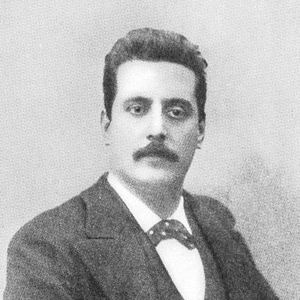Giacomo Puccini was the most important composer of Italian opera after Verdi. He wrote in the verismo style, a counterpart to the movement of Realism in literature and a trend that favored subjects and characters from everyday life for opera. On his often commonplace settings Puccini lavished memorable melodies and lush orchestration. It was around the turn of the twentieth century that he reached his artistic zenith, composing in succession his three most popular and effective operas, La Bohème, Tosca, and Madama Butterfly.
Young Giacomo took organ lessons early on from his uncle, Fortunato Magi, and later from Carlo Angeloni. At ten, he sang in local church choirs and by age 14 was freelancing as an organist at religious services. His first compositions were for organ, often incorporating operatic and folk elements. By age 18, under the spell of Verdi’s Aida, he decided he would study composition with a view to writing opera. At around this time, he composed his first large-scale work, a cantata, Preludio Sinfonico, for an 1877 competition. Other pieces came in the next few years, but none of significance.
In 1880, Puccini entered the Milan Conservatory, where he studied for three years under Ponchielli and Bazzini. While there, he wrote his first opera, Le villi, which he once more entered in a competition. Though he lost, Arrigo Boito and, more importantly, publisher Giulio Ricordi helped arrange a premiere in Milan on May 31, 1884. The work was enthusiastically received, and Puccini was on his way.
Around this time the composer met Elvira Gemignani, wife of a merchant in Lucca. They carried on an illicit affair, and she gave birth to his son in 1886. When her husband died in 1904, the two were married. Puccini’s next opera, Edgar, was poorly received at its 1889 premiere. Subsequent revisions failed to rescue it from its encumbering libretto. His next effort, however, Manon Lescaut, was a sensational success at its 1893 Turin premiere. Subsequent performances in Italy and abroad bolstered the composer’s growing reputation.
Puccini’s next three operas confirmed his preeminence in Italian opera. La Bohème (1896), Tosca (1900), and Madama Butterfly (1904) were not immediately as successful as Manon Lescaut, but in time achieved greater acclaim. By the middle of the twentieth century, they had become — and remain today — his most often performed and recorded works.
Puccini suffered a creative dry spell for a time and was unable to finish another opera until the moderately successful La fanciulla del West (1910), which premiered in New York with Toscanini conducting and Caruso singing the role of Johnson. His sluggishness of inspiration owed much to charges by his wife he was having an affair with a servant girl, charges that drove the hapless, and as it turned out, innocent young girl to suicide in 1909.
In 1913, Puccini accepted a lucrative commission from Vienna interests, which resulted in La rondine. Received warmly at its 1917 Monte Carlo premiere, it faded under the judgment it was the least of his operatic efforts. Puccini followed this disappointment with his trilogy of one-act operas, Il trittico — comprised of Il tabarro, Suor Angelica, and Gianni Schicchi — all premiered at the Metropolitan Opera in New York in 1918. Only the latter work, a comedy, was well received.
While Puccini was working on his last opera, Turandot, he was diagnosed with throat cancer (1923). During radiation treatment in Brussels, he suffered a heart attack and died on November 29, 1924.


10 thoughts on “Kaminos”
Was Nicholas related to Alexander Saslavsky who married Celeste Izolee Todd?
Anyone have a contact email for Yair Klinger or link to score for Ha-Bayta?
wish to have homeland concert video played on the big screen throughout North America.
can organize here in Santa Barbara California.
contacts for this needed and any ideas or suggestions welcomed.
Nat farber is my great grandpa 😊
Are there any movies or photos of max kletter? His wife’s sister was my stepmother, so I’m interested in seeing them and sharing them with his wife’s daughter.
The article says Sheb recorded his last song just 4 days before he died, but does not tell us the name of it. I be curious what it was. I’d like to hear it.
Would anyone happen to know where I can find a copy of the sheet music for a Gil Aldema Choral (SATB) arrangement for Naomi Shemer’s “Sheleg Al Iri”. (Snow on my Village)?
Joseph Smith
Kol Ram Community Choir, NYC
שלום שמעון!
לא שכחתי אותך. עזבתי את ישראל בפברואר 1998 כדי להביא את בני האוטיסט לקבל את העזרה המקצועית שלא הייתה קיימת אז בישראל. זה סיפור מאוד עצוב וטרגי, אבל אני הייתי היחיד עם ביצים שהביא אותו והייתי הורה יחיד בשבילו במשך חמישה חודשים. הוא היה אז בן 9. כעת הוא בן 36 ומתפקד באופן עצמאי. נתתי לו הזדמנות לעתיד נורמלי. בטח, אבות כולם חרא, אומרים הפמינציות, אבל כולם צריכים לעבוד כמטרות במטווחי רובה!
משה קונג
(Maurice King)
Thank you for this wonderful remembrance of Herman Zalis. My late father, Henry Wahrman, was one of his students. Note the correct spelling of his name for future reference. Thank you again for sharing this.
Tirza Wahrman (Mitlak)
amazing zchuso yagein aleinu, he wrote the famous niggun Lefichuch that is sung in almost every Israeli Yeshiva